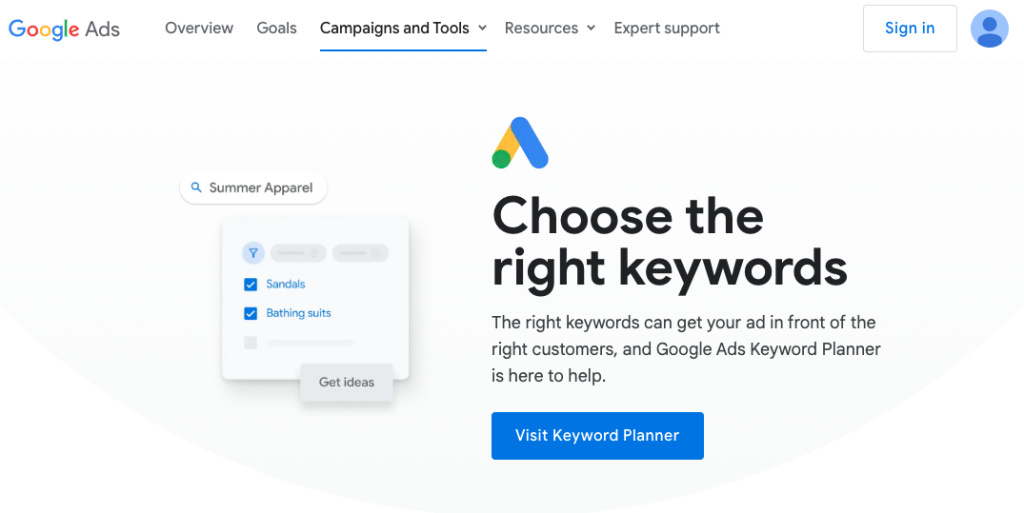Top 10 PPC Interview Questions
Prepare for your next interview with our handpicked list of top PPC interview questions.
14 Jul 2023

We’ve handpicked the top 10 PPC interview questions for you, to help you get ready for your next job opportunity. Some of these questions might seem pretty straight forward, but even the savviest PPC experts need to prepare. Trust us, we’re not underestimating your expertise here. But thinking about how you’ll answer these questions will help keep your mind sharp on interview day. Of course, you’ll need to tailor your answers to the job you’re going for – whether it’s focused on search ads/social media ads, agency/in-house, or service/product-led etc. So, with that in mind, here are the questions:
1) What’s your process for selecting keywords for a PPC campaign?
Keyword research is the backbone of a successful PPC campaign – so naturally, the interviewer will want to check how you decide which keywords to use and which tools you use. We’ve got no doubt you know the keyword selection process like the back of your hand, so answering this question might seem like you’re jumping through hoops. But you need to cover your typical process in detail to show that you’ve got the right experience and the technical know-how. Make sure you mention:
- Tools – the tools you use like Google Keyword Planner or Semrush.
- Metrics – which metrics you use to assess and select relevant keywords for your campaigns e.g monthly search volume, CPC etc.
- Analysis – how you analyse and leverage competitor insights.
- Long-tail keywords – how you incorporate long-tail and specific keywords to reach a more specific audience and increase chances of conversion.
- Negative keywords – how you identify negative keywords.

2) How do you create mobile-friendly campaigns?
Depending on the nature of the job, you might get asked a question on creating successful mobile campaigns. In your answer, you’ll need to emphasise the importance of user experience, targeted messaging, and data-driven optimisations. Mention things like:
- Ad copy and creative – talk about how you tailor your ad copy/CTAs and use the right creative assets.
- Click to call – explain how you utilise click-to-call to boost engagement and mobile conversions.
- Mobile-friendly landing pages – tell your interviewer how you make suggestions on mobile-friendly landing page design. Because of course, landing pages play a massive part in turning clicks into customers.
- Mobile specific targeting – talk about how you utilise mobile specific targeting options like mobile-only ad scheduling, operating system or device model targeting, location-based targeting etc.
- Other mobile best practices – mention any other best practices you use.
3) How do you usually approach campaign optimisation?
Your interviewer will be looking for evidence of your data-driven decision-making here. They want to know how you analyse data and leverage it to optimise your campaigns and drive results. Here are some key things to include in your answer:
- Analysis – how you analyse campaign performance metrics like CTR, CPC, ROAS, and so on, to identify areas that are performing well and areas for improvement.
- Data – how you use this data to make informed decisions on bid management, ad copy testing, audience targeting adjustments, and budget allocation etc.
- Monitoring – how you closely monitor a campaign’s performance and continuously iterate it. This is important because the interviewer will be looking for someone who continuously and proactively optimises their campaigns to drive better results.
4) Can you describe a successful campaign you’ve managed?
This is your opportunity to showcase your accomplishments and demonstrate your expertise, so take this chance and run with it. You need to start by giving a brief overview of the campaign – its objectives, target audience etc. before going into more detail on:
- Strategy and execution – talk about the strategic approach you took to achieve the campaign objectives.
- Results and impact – come prepared with some tangible results and data to quantify the campaign’s success and impact. The more specific, the better! Because the interviewer needs to hear about the metrics you used to measure success and see specific numbers and percentages to get a real sense of the campaign’s results and impact.
- Lessons learned – the interviewer will want to know that you can identify success and learn from it. So, talk about any strategies and techniques that worked particularly well and how you can apply these to future campaigns.
Of course if there were any out-of-the-box elements that made the campaign stand out then let the interviewer know about that too!
5) What’s your approach to developing a local PPC strategy?
If your prospective employer is looking to drive local conversions, you might get asked a question about local strategy. You’ll need to explain how you determine your goals and budget (just like you would with any strategy), but you’ll also need to go into detail on your process for: 
- Selecting local keywords
- Creating relevant ad copy/assets
- Using relevant ad extensions like location or call extensions
- Creating relevant landing pages
- Targeting relevant audiences
6) How do you track and measure the success of a PPC campaign?
We think it’s best to split your answer to this question into two halves:
- The metrics you track – talk about the various metrics and KPIs you use to measure campaign success. Of course there are plenty of metrics you could talk about, but focus on the ones you think will be most important to your prospective future employer e.g CTR, CPC, ROAS, and overall ROI.
- How you track them – you’ll also need to talk about how you track these metrics and KPIs and which tools you use.
7) How do you stay up-to-date with industry trends and changes?
PPC is an ever-evolving world, so your interviewer will be on the lookout for someone who stays ahead of the game and up-to-date. They’ll be keen to hire someone with a genuine commitment and passion for the field. So, this is your chance to show that you tick all of these boxes and are always pushing to learn and grow. Mention things like:
- Social media – talk about groups you’re part of or key people you follow to stay in the loop.
- Training – tell the interviewer about any training or certifications you’ve completed.
- Meetups – let the interviewer know about any meetups, conferences, or events you go to.
- Blogs – talk about relevant industry blogs you read/subscribe to.
8) Can you give an example of how you’ve successfully collaborated with other people/teams?
Most PPC roles involve an element of teamwork – whether that’s working with account managers, graphic designers, or CRO specialists. So, the interviewer will likely want to check your communication and collaboration skills. Try to pick a specific example that really highlights your ability to work effectively as part of a team, and make sure you mention:
- Roles and responsibilities – talk about the different roles of the people you worked with and try to tailor this to the job you’re applying for. If the job involves working closely with designers and account managers, pick an example where you’ve worked with designers and account managers, as this will resonate with the interviewer.
- Communication and coordination – highlight how you facilitated clear and open communication and discuss the channels you used like project management tools or regular meetings.
- Active listening and respect for ideas – talk about how you actively listened to other people’s ideas, perspectives and suggestions.
- Results and impact – describe the positive outcomes that you achieved by working collaboratively, and ideally use data to quantify the impact!
9) How do you anticipate PPC changing in the future?
Of course there’s no right or wrong answer here, because no one can accurately predict the future! But this is a chance to share your perspective on what’s to come. Use this as an opportunity to show that you’re genuinely curious and interested in this rapidly-evolving field. There are so many things you can talk about (this question is a bit of a blank canvas really), but if you’re looking for some inspiration, you could talk about:
- The increased use of AI and machine learning that’s predicted
- Voice search
- Greater levels of personalisation
- An increased focus on privacy
10) Can you describe a challenging situation you’ve encountered with a client and how you successfully managed it to maintain a positive working relationship?
In the nicest way possible, clients can be challenging. They can be overly critical, demanding, indecisive… the list goes on! So, if you’re interviewing for a client-facing position, your interviewer will need to know how you’ll handle challenges and setbacks. Of course if you’re not going to be client-facing, there’s no need to prepare for this question. To answer this question properly, you need to prepare an example that shows you’re capable of:
- Keeping calm and professional in a challenging situation
- Showing empathy and listening to client concerns
- Resolving issues quickly
- Managing client expectations
- Communicating effectively
- Learning from mistakes or failures
- Achieving great results despite challenges or setbacks
If you’re not sure whether you want to be client-facing or not, check out the pros and cons of working in an agency vs. in-house.
Other PPC interview questions
We’ve covered some of the most common PPC interview questions, but of course, the questions you get asked will totally depend on the job you’re applying for. The above questions should be a really good starting point for you though. Other typical questions include:
- How do you usually approach competitor analysis?
- How do you handle pressure when working to tight deadlines?
- Can you describe a challenging PPC campaign you’ve managed? How did you overcome the obstacles?
- What steps would you take to improve conversion rates?
- What sort of budgets do you have experience of working with?
- What’s your approach to distributing budgets?
- What do you do on a daily, weekly, and monthly basis to ensure that budgets are best spent?
- How would you explain paid media to someone who has absolutely no knowledge of it?
If you’re looking for more inspiration, TestGorilla has compiled a pretty comprehensive list of PPC specialist interview questions. There are plenty of other examples of PPC interview questions online, but you can tell that lots of them have been written by someone who has little knowledge of PPC/never interviewed for a PPC job – so here’s your reminder to stick to trusted sources when you’re doing your interview prep.
Conclusion
By preparing your responses to these common PPC interview questions, you’ll give yourself the best chance of confidently navigating your interview process. Just remember to tailor your responses to the job you’re applying for. While you’re here, why not check out our latest PPC jobs?
Or if you’re looking to hire, read more about our PPC recruitment services.